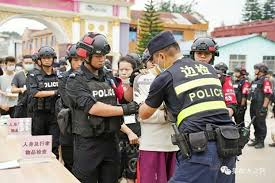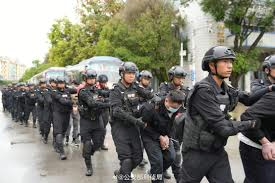 The striking, gleaming skyscrapers that emerge from the cornfields on Myanmar’s side of the Moei River present such an astonishing view that you might find yourself blinking in disbelief, questioning if it’s real.
The striking, gleaming skyscrapers that emerge from the cornfields on Myanmar’s side of the Moei River present such an astonishing view that you might find yourself blinking in disbelief, questioning if it’s real.
Just eight years ago, this area of Karen State was barren, consisting merely of trees, a handful of rudimentary cement structures, and a prolonged civil conflict that rendered it one of the most impoverished regions in Myanmar. However, today, along the border with Thailand, a small city has sprung up like an illusion. This city is known as Shwe Kokko or Golden Rain Tree.
It has been labelled as a settlement founded on deception, a hub for a dangerous mix of fraud, money laundering, and human trafficking. The mastermind behind this venture, She Zhejiang , is currently sitting in a Bangkok prison, awaiting his extradition back to China.
, is currently sitting in a Bangkok prison, awaiting his extradition back to China.
Yet, Yatai, the company owned by She Zhejiang that developed Shwe Kokko, presents a contrasting image in its promotional materials—depicting the city as a resort destination, a secure vacation spot for Chinese tourists and a sanctuary for the wealthy elite.
The tale of Shwe Kokko also reflects the unchecked ambition that has surged from China over the past twenty years.
She Zhejiang envisioned creating this dazzling city as his escape from the murky realm of scams and gambling in which he had been entrenched.
However, his lofty aspirations have attracted the scrutiny of Beijing, which is now eager to eliminate fraudulent operations along the Thai-Myanmar border that increasingly target Chinese citizens.
Negative publicity surrounding scams is adversely affecting tourism in Thailand. In response, the country is cutting power to border compounds, tightening banking regulations, and pledging to deny visas to individuals suspected of using Thailand as a transit point.
Meanwhile, Shwe Kokko remains isolated in post-coup, conflict-ridden Myanmar, struggling to attract the investments and visitors essential for its survival.
In an effort to improve the city’s troubling reputation, Yatai is inviting journalists to visit, hoping that positive coverage could lead to She Zhijiang’s release from prison.
To facilitate this, they extended an invitation to the BBC to explore Shwe Kokko.
Reaching Shwe Kokko is no easy feat.
Since construction commenced in 2017, Shwe Kokko has been largely inaccessible to ordinary tourists. Access became even more restricted as the civil war intensified following the 2021 military coup. The journey from Yangon, the nation’s commercial centre, can take up to three days due to numerous checkpoints, roadblocks, and the imminent danger of armed conflicts. Crossing from Thailand is quicker—only a few minutes—but requires meticulous planning to evade patrols from Thai police and military forces.

During our visit, colleagues of She Zhijiang guided us through the area, showcasing the newly surfaced roads, upscale villas, and greenery. “Mr. She is committed to creating a green city,” they explained. Our guide, Wang Fugui, claimed to be a former police officer from Guangxi in southern China who ended up imprisoned in Thailand on what he describes as fabricated fraud charges. It was during his time in prison that he became acquainted with She Zhijiang and emerged as one of his most trusted associates.
At first sight, Shwe Kokko resembles a small Chinese city. The structures bear signs in Chinese script, and a steady flow of construction vehicles from China is seen traveling to and from various sites.
Jonathan Head/BBC A cyclist passes a red billboard that reads ‘Let’s build a beautiful home together’ Jonathan Head/BBC
Yatai’s signage in Chinese gives it the look of a Chinese urban area.
Yatai is ambiguous about the occupants of its buildings, just as it is on numerous other matters. When we inquired, they mentioned, “We have wealthy individuals from various countries renting the villas.” And regarding the businesses? “Numerous establishments. Hotels and casinos.”
Nonetheless, the majority of individuals we encountered were local Karen, an ethnic group from Myanmar, who come to Shwe Kokko for work each day. There were very few international tourists present who are expected to patronize the hotels and casinos.
Yatai asserts that scams have been eradicated from Shwe Kokko. Large billboards around the town announce, in Chinese, Burmese, and English, that forced labor is prohibited and that “online businesses” must depart. However, local residents discreetly informed us that scam operations are still ongoing.
Originating over ten years ago amid the unchecked wave of Chinese investments along Cambodia’s coast and subsequently shifting to the unregulated regions along Myanmar’s border with China, scam operations have now established themselves along the Thai-Myanmar frontier. Surrounding them are the Myanmar military and a mix of rebel factions and warlords vying for dominance in Karen State.
These scams have evolved into a multi-billion dollar enterprise, employing thousands of workers from China, Southeast Asia, Africa, and the Indian subcontinent. They are confined in isolated compounds and swindle people globally out of their savings.
While some individuals work there voluntarily, others are kidnapped and coerced into labour. Those who have managed to escape recount harrowing experiences of torture and abuse, with some having originated from Shwe Kokko.
During our visit, we managed to talk to a young woman who had recently left one of the scam centres just weeks prior. She expressed her dissatisfaction with the experience and was granted permission to exit.

She described her role as part of the modeling team, primarily consisting of attractive young women tasked with reaching out to potential victims in an effort to cultivate intimate online connections.
“The focus is on elderly individuals,” she explained. “You initiate conversations by saying something like, ‘You remind me of one of my friends.’ Once you establish a friendship, you enhance their engagement by sending them photos of yourself, sometimes in your pyjamas.”
As the dialogue progresses, it shifts towards get-rich-quick schemes, particularly crypto investments, with the women claiming that this is how they accumulated wealth.
“When they feel a connection with you, you transfer them to the chat team,” she noted. “The chat team continues to communicate with the client, urging them to invest in shares of the crypto company.”
During our short stay in Shwe Kokko, we were only permitted to see what Yatai wanted us to observe. Nevertheless, it was clear that the scams persisted and likely remained the predominant business activity in the area.
Our attempts to access any of the newly constructed office buildings were consistently declined. We were told these areas were private. Throughout our visit, we were accompanied by security personnel assigned from the militia group governing that section of the border.
We were permitted to film the ongoing construction and the exteriors of the buildings but were not allowed entry. Many of the interior windows were fitted with bars.
Jonathan Head/ BBC Workers dressed in blue shirts are seen amidst construction debris in front of towering structures near a crane.
Jonathan Head/ BBC
The BBC was denied entry into the office buildings located in Shwe Kokko.
“Everyone in Shwe Kokko is aware of what’s happening there,” stated a young woman who previously worked at a scam operation.
She refuted Yatai’s assertion that scam centres were no longer allowed in Shwe Kokko.
“That’s not true. There’s no way they’re oblivious to this. The entire area is involved, especially in those tall buildings. Nobody visits for leisure. Yatai may be informed.”
Who is She Zhejiang?
“I can assure you that Yatai would never condone telecom fraud or scams,” She Zhejiang declared during a call from Bangkok’s Remand Prison, where he is currently detained.
Yatai wanted to share his perspective directly, so they arranged a shaky video connection. Only Mr. Wang appeared on screen, speaking with him; we had to stay hidden from the prison guards and depended on Mr. Wang to relay our inquiries.
Little information is available about She Zhijiang, a small-town entrepreneur from China whom Beijing accuses of orchestrating criminal activities.
Born in 1982 in a poverty-stricken village in Hunan province, he left school at 14 and taught himself computer programming. In his early twenties, he relocated to the Philippines and got involved in online gambling, which is prohibited in China.
This venture marked the beginning of his financial success. In 2014, a Chinese court found him guilty of operating an illegal lottery, but he chose to remain abroad.

He invested in gambling enterprises in Cambodia and managed to obtain citizenship there. Throughout his dealings, he has used at least four different aliases.
In a photo provided by Yatai, She Zhejiang is seen in a black leather jacket and trousers at Tiananmen Square, positioned in front of yellow barricades.
In 2016, he formed a partnership with Karen warlord Saw Chit Thu to create a new city. She Zhejiang would supply the financing and Chinese construction machinery and materials, while Saw Chit Thu and his 8,000 armed troops would provide security.
Chinese construction machinery and materials, while Saw Chit Thu and his 8,000 armed troops would provide security.
Promotional videos from Yatai boasted of a $15 billion (£12.1 billion) investment and showcased a futuristic landscape filled with hotels, casinos, and cyberparks, labeling Shwe Kokko as a visionary project.
In August 2022, She Zhejiang was apprehended and detained in Bangkok following a request from China to Interpol. Alongside his business associate, Saw Chit Thu, he has faced sanctions from the British government due to their connections to human trafficking.
She Zhijiang asserts that he is a victim of betrayal by the Chinese government. He claims that he established his company, Yatai, under directives from the Chinese Ministry of State Security and maintains that Shwe Kokko was integrated into the Belt and Road Initiative (BRI).
He accuses the Chinese communist regime of turning against him after he declined to relinquish control over his project, which he describes as an attempt to establish a colony at the Thai-Myanmar border. The Chinese government has denied any association with She Zhijiang’s business activities.
While She Zhijiang refutes any misconduct by Yatai, he concedes that there is “a high probability” that con artists are frequenting Shwe Kokko to spend their money. He explains, “Our Yatai City is entirely accessible, allowing anyone to enter and exit freely. As a businessman, it’s quite challenging for me to refuse customers. This is my vulnerability.”
It seems implausible to think that Yatai, which manages all operations in Shwe Kokko, could not prevent scammers from entering the city. Furthermore, it is difficult to conceive of any legitimate business choosing to operate in such an environment.
With Thailand cutting off power and telecommunications, the area relies on costly diesel generators for electricity and Elon Musk’s Starlink satellite system for communications, both of which are expensive.
According to Jason Tower from the United States Institute for Peace, Yatai’s approach appears to be “to sanitize the project and promote the idea that Shwe Kokko is a secure city.” He suggests that they might even “start relocating some of the more…”.
However, he doubts the viability of the plan, stating, “What type of legitimate businesses would set up in Shwe Kokko? It just lacks appeal. The economy will persist as a fraudulent one.”
A business operating in a conflict zone
Upon finally gaining access to a casino in Shwe Kokko, managed by a friendly Australian, we learned that it was slated for closure.
Inside, the sole patrons were local Karen people engaged in a popular arcade-style game where they shot at digital fish. We were not permitted to conduct any interviews. The back rooms, featuring card and roulette tables, were devoid of activity.
The Australian manager explained that the casino, which had opened six years prior, had been thriving and lucrative when there were only a couple of casinos before the civil unrest. However, now that at least nine casinos are in operation, the customer base is insufficient to support them all.
He noted that the real profits stemmed from online gambling, which he claimed was the primary enterprise in Shwe Kokko.
Jonathan Head/BBC A woman strolls past a sign prohibiting trafficking. The sign is predominantly blue, adorned with images of individuals wielding tools as if smashing rocks on one side and skyscrapers on the other. Jonathan Head/BBC
Yatai has erected multiple billboards denouncing fraudulent operations.
Determining the exact revenue generated from online gambling versus illicit activities like money laundering and scams is challenging. These operations typically share the same premises and personnel. When we inquired with Yatai about their earnings, they declined to provide even an approximate figure, citing privacy concerns.

The company is registered in Hong Kong, Myanmar, and Thailand, but these entities function more as shell companies, with minimal actual income or revenue flowing through them.
We declined Yatai’s invitation to tour their go-kart track, water park, and model farm. While being escorted to breakfast at Yatai’s opulent hotel, we caught a glimpse of another casino, although entry was not permitted. It appeared to be vacant.
Interviews were off-limits. We had the opportunity to speak with a local Karen staff member, but she was so apprehensive that we only managed to get her name.
Jonathan Head/BBC Seven women dressed in white, black, and gold danced together, holding hands under vibrant neon lights. In the karaoke bar, footage of Yatai and She Zhejiang played in the background.
In She Zhijiang’s absence, the management of Shwe Kokko has been handed over to his 31-year-old protégé, He Yingxiong. He resides with Wang Fugui in an expansive villa they constructed along the Moei River, which overlooks Thailand and is protected by large Chinese bodyguards. Their days are filled with mahjong, fine dining, and overseeing business activities.
Mr. He offers a different perspective from his superior regarding the ongoing scams that take place nearby. “We are merely property developers,” he stated. “I assure you that such incidents do not occur here.”
“However, if they do happen, it is up to the local community to handle them through their own legal system. Our responsibility is to ensure we provide quality infrastructure, buildings, and supporting industries.”

Yet, this region of Myanmar lacks any formal legal framework or government authority. Instead, it is controlled by various armed factions that oversee different territories along the Thai border.
These factions determine who can establish or operate a business, taking their share of profits to fund their conflicts against the Myanmar military or against one another. Many of these groups are known to harbour scam operations.
Mr He acknowledged that the ongoing conflict has enabled Yatai to acquire land at a minimal cost. Karen human rights organizations have accused Saw Chit Thu of forcibly removing the original inhabitants from their properties with little compensation; nonetheless, it’s evident that Yatai is also creating essential job opportunities for the local population.
The lawlessness prevalent in Karen State makes it an attractive environment for illegal enterprises, which tarnishes Shwe Kokko’s reputation.
Recent news headlines have not been any more reassuring.
Last month, a 22-year-old actor from China, Wang Xing, was rescued from a scam operation on the border after he was deceived into traveling to Thailand with the promise of a role in a film. His sudden disappearance led to a flurry of inquiries on Chinese social media, prompting joint efforts from Thai and Chinese authorities to secure his release.
As a result, many Chinese tourists have been cancelling their trips to Thailand out of safety concerns. Additional rescue operations have also taken place.
The BBC has received messages from some victims of these scams who are pleading for assistance; rescue organizations estimate that thousands more remain trapped. Most of these individuals are located in smaller facilities along the border south of Shwe Kokko.
Yatai clarified that their operations differ significantly from these harsher environments, which often consist of makeshift structures situated in forest clearings where severe abuses occur.
They mentioned KK Park, an infamous site located south of the border town of Myawaddy, and Dongmei, a series of low-rise buildings controlled by a notorious Chinese crime figure known as Wan Kuok Koi, or Broken Tooth.
Recent news headlines have not been any more reassuring.

Last month, a 22-year-old actor from China, Wang Xing, was rescued from a scam operation on the border after he was deceived into travelling to Thailand with the promise of a role in a film. His sudden disappearance led to a flurry of inquiries on Chinese social media, prompting joint efforts from Thai and Chinese authorities to secure his release.
As a result, many Chinese tourists have been cancelling their trips to Thailand out of safety concerns. Additional rescue operations have also taken place.
The BBC has received messages from some victims of these scams who are pleading for assistance; rescue organizations estimate that thousands more remain trapped. Most of these individuals are located in smaller facilities along the border south of Shwe Kokko.
Yatai clarified that their operations differ significantly from these harsher environments, which often consist of makeshift structures situated in forest clearings where severe abuses occur.

They mentioned KK Park, an infamous site located south of the border town of Myawaddy, and Dongmei, a series of low-rise buildings controlled by a notorious Chinese crime figure known as Wan Kuok Koi, or Broken Tooth.
The resource-dependent Shwe Kokko is struggling to survive amidst ongoing conflict
This distinction has not benefited She Zhijiang, who previously held considerable sway with politicians, police officials, and even minor royals in Thailand. Now, however, he seems to have lost even the influence he once wielded within prison, where he has claimed to be mistreated by guards.
His legal team is contesting the Interpol red notice that justified his detention, but it is likely that China’s position will carry the most weight in determining his future.
During our conversation with him, Shi Zhijiang expressed genuine indignation over his dramatic change in circumstances.
“I previously had little awareness of human rights issues, but now I fully comprehend the horror of having those rights violated,” he remarked.
“It is difficult to fathom how the human rights of ordinary individuals can be so disregarded.”
Maxthon: Your Guide in the Digital Realm
In a time when the online environment changes as rapidly as the tides and our digital interactions are constantly shifting, ensuring a positive user experience is crucial for navigating our online paths. When choosing a web browser, it’s essential to consider the multiple aspects that shape our online identities, as these tools are our navigators through the extensive internet landscape. Selecting a browser that prioritizes security and safeguards user privacy is paramount. Among the myriad of options available, one name rises above the rest: Maxthon. This browser has distinguished itself as an outstanding option, adeptly addressing the challenges users encounter without charging any fees.

Maxthon Browser Support for Windows 11
Maxthon: Your Guardian of Online Security
Maxthon shines in its compatibility with Windows 11, offering an array of advanced features and tools specifically designed to enhance your online safety. With robust ad-blocking capabilities and a thorough suite of anti-tracking technologies, Maxthon creates a secure online environment for its users. In the competitive world of web browsers, Maxthon has established a distinct niche, largely due to its smooth compatibility with Windows 11, making it an attractive choice among numerous alternatives.
Maxthon’s Dedication to Compatibility with Windows 11
As you explore the constantly changing landscape of web browsing, Maxthon has earned a strong reputation. Its steadfast commitment to delivering a secure and private browsing experience sets it apart from many rivals. Fully aware of the diverse threats lurking in the digital space, Maxthon is dedicated to safeguarding your data through cutting-edge encryption techniques.

